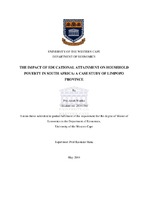| dc.description.abstract | From 1947-1994, South Africans were ruled under apartheid – a racially discriminatory political and economic system. As the name itself implies, apartheid is an Afrikaans name meaning “apartness”. The provision of education in South Africa during this regime was poor, particularly for the African (black) population and most especially those living in homelands. This led to under-investment in human capital development particularly in the rural areas which resulted in, low levels of skills that have persisted till today. This has hindered those lacking the required skills to obtain lucrative employment and earning prospects. This study aims at investigating the impact of a household head’s educational attainment level on the poverty status of the household in South Africa with case study of Limpopo province. This study sought to establish if education has an effect on the poverty status of households in Limpopo Province. The Income and Expenditure Survey (IES) data conducted by Statistics South Africa, for the period 1995, 2000, 2005/06 and 2010/11 were used to carry out this investigation. The official absolute income poverty lines of R3864 (lower bound) and R7116 (upper bound) per capita per annum in 2000 prices were used. In order to establish the relationship between education and the poverty status of an individual or a household, a probit regression model has been used. The results obtained revealed that, there is a strong tendency for lower educational attainment to be associated with a higher prevalence of household poverty. That is, households headed by someone with primary or no education are more likely to be poorer than those headed by someone with tertiary education. Rural and Black households are the most vulnerable in Limpopo Province. Although there is large allocation of resources towards education, educational outcomes have not improved. This raises questions regarding the lack of association between educational outcomes and resource allocation. | en_US |

